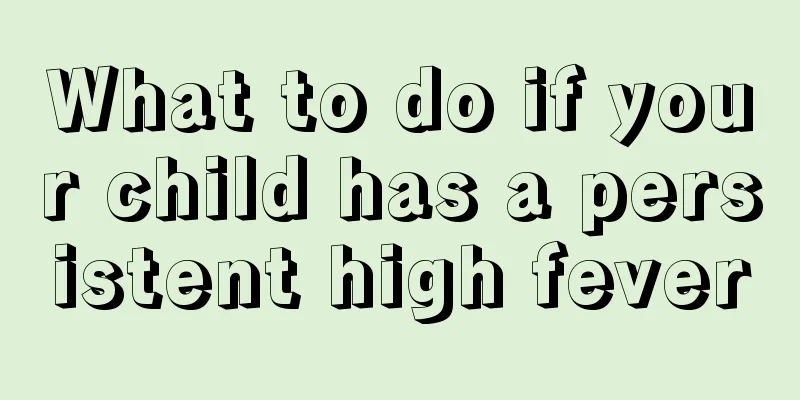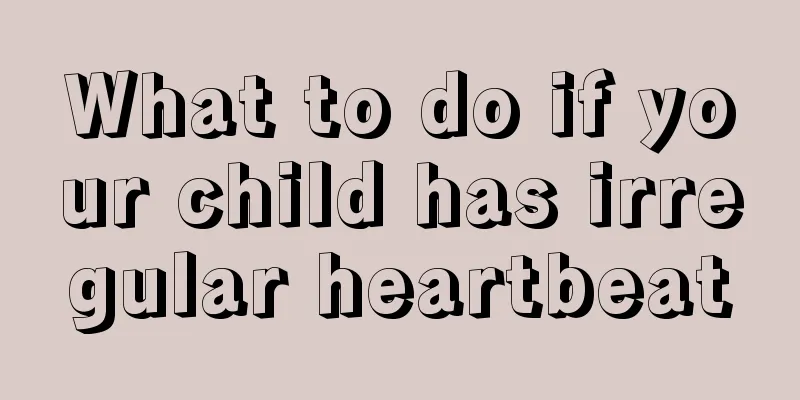What to do if your child has a persistent high fever

|
When children are sick, it is the most headache-inducing thing for parents, because when their children are sick, parents will become anxious, and if the child continues to have a high fever, the parents' hearts will be really tormented. It is said that children are the apple of their parents' eyes. Who doesn't want their children to be healthy? So what should you do if your child has a persistent high fever? Here are some tips for you. 1) Pay attention to your child’s mental state. If the child has a high fever but is in good spirits, and can still laugh and play after taking medicine to reduce the fever, and is almost the same as usual, it means that the child's condition is not serious and he or she can be rest assured to recuperate at home. If the child is listless, tired, and has a dull expression, it indicates that the child is seriously ill and should be taken to the hospital immediately. (2) Observe the child’s facial complexion. If the child's complexion is normal or flushed, you can safely care for him/her at home. If the face is dull, yellow, blue, or purple, and the eyes are dull, it means the condition is serious and the person should be sent to the hospital. (3) Observe whether the child has severe, projectile vomiting. If so, it indicates the possibility of brain disease, the child should be taken to the hospital. (iv) Check the skin for rashes; if present, this may indicate an infectious disease or drug allergy. Check whether the skin turns purple or cool, which indicates circulatory failure. In both cases, you need to go to the hospital again. (5) Observe whether the child has abdominal pain and bloody stools. Abdominal pain that does not allow massage indicates acute abdomen, and bloody stools indicate dysentery, etc., and the child must be taken to the hospital. If the child only has a high fever and does not have the above complications, there is no need to worry even if the fever subsides slowly or recurs from time to time. You should patiently treat and care for the child at home. You can take the following measures: (1) Keep the environment quiet, comfortable and moist, ventilate the room regularly, and adults should not smoke. (2) Fever is the body's protective response against microbial invasion and is beneficial to enhancing the body's resistance. Therefore, there is no need to take antipyretics if the body temperature is below 38.5℃. Antipyretic measures are only required if the body temperature exceeds 38.5℃. {3) The sick child should not wear too many clothes, the quilt should not be too thick, and the child should not be "sweat-covered" to avoid affecting heat dissipation and causing the body temperature to rise even higher. (4) Encourage children to drink more water and eat more fruits. After having a fever, the child's appetite decreases. You can prepare some delicious and easy-to-digest meals and choose the time when the child's temperature is not high or when he or she has taken medicine to reduce the fever to eat, but do not let the child eat too much. (V) Maintain smooth bowel movements. Fever is probably the symptom that takes up the most time, causes the most worry, and causes the most anxiety for parents. If a child has a fever, he or she should go to the hospital for treatment. In addition to this, of course there are more ways to solve the problem of children's persistent high fever, but we all know that if children take too many medicines, it will cause harm to the body and reduce the child's own immune function. Therefore, if the child's high fever can be eliminated by himself, try to let the child's own immune system play a role. If it doesn't work, go to the hospital for treatment. |
<<: What is the situation of red pimples on the child's face
>>: Daily care for children with diarrhea after fever
Recommend
Tips for dealing with a high fever in children
It is generally necessary to be careful when chil...
Why is my baby late in speaking?
In today's social life, we often see slogans ...
How to detect jaundice in babies?
Babies may have jaundice when they are born, but ...
What will zinc deficiency cause? Zinc deficiency is very harmful to children
Many children have symptoms of zinc and calcium d...
Causes of red and swollen eyes in children
The physical conditions of people of different ag...
Red rash on back of baby's neck
As the baby grows, his hair will become longer an...
Daily taboos for babies with allergic constitution
Many people should have something to say about al...
Causes and treatments of restless sleeping in babies
Babies will become insecure after leaving their m...
What should I do if my arm is swollen after getting a vaccination?
After the baby is born, timely vaccination is nec...
Why is the 8-year-old girl's underwear yellow?
If an eight-year-old girl's underwear is slig...
What to do if your baby is anemic at ten months old
Babies' physical resistance is always weaker ...
Precautions for baby swimming in summer
As the weather continues to get hotter, many pare...
What should I do if my child has swollen upper eyelids?
Swollen eyelids are a common phenomenon for many ...
Hard lumps on children's feet
Adults will develop many lumps on the soles of th...
Prevention of febrile seizures in children
Febrile convulsions in children refer to a common...









